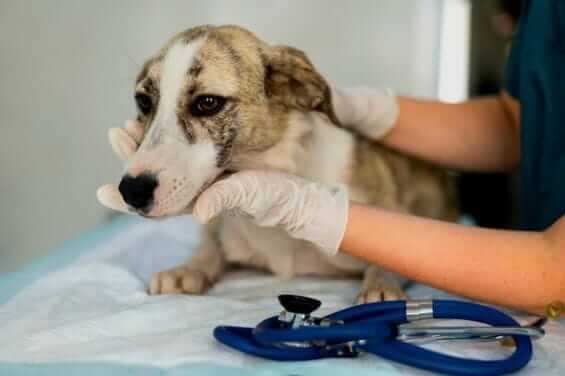The health and well-being of our beloved canine companions are our biggest responsibility. As a dog owner, a swollen abdomen in dogs is a matter that should never be taken lightly. A swollen abdomen or abdominal distension in dogs can be a sign of various factors, some less concerning than others.
However, when your dog’s abdominal region appears swollen and exhibits certain indicative signs, it’s essential to seek immediate medical attention.

What Is Abdominal Distension In Dogs?
Abdominal enlargement, often referred to as a swollen or distended abdomen, is a condition where a dog’s belly protrudes beyond its normal outline. While this can sometimes be a harmless occurrence, it can also be indicative of underlying health issues.
What Are The Causes Of Swollen Abdomen In Dogs?
Sometimes times dogs abdomen distended due to some harmless and simple reasons but sometimes there are some major and serious conditions that cause it. Let’s explore both simple and complex causes of the swollen stomach on dogs:
1-Intestinal Parasites (Worms):

Puppies are more susceptible to intestinal parasites, which can lead to abdominal distension. It is mostly treated by giving some deworming medication to dogs. Deworming medications are very effective.
2-Overeating and Obesity:
Overeating and lack of exercise cause weight gain in dogs which leads to obesity. When dogs gain weight a lot of fat starts to accumulate in their bodies, especially in the abdominal region. This fat accumulation makes their abdomen bulky and oversized.
Obesity can also cause hormonal imbalances in dogs.
3-Pregnancy:
Female dogs show abdominal enlargement during pregnancy. Sterilizing non-breeding females at a young age is an effective preventive measure.
4-Organ Enlargement:
Enlargement of abdominal organs often indicates underlying illnesses like infectious diseases, inflammation, and various types of tumors.
5-Free Fluid in the Abdomen:
The accumulation of fluid in the abdomen can be urine, blood, or effusion (fluid that escapes from body tissues).
Various causes, such as trauma, surgery, bleeding disorders, and tumors, can lead to free fluid accumulation. This accumulation makes the stomach bulky.
6-Tumor/Cancer:
Tumors and cancers that affect abdominal organs can cause abdominal distension in dog.
7-Heart Disease:
Heart failure in dogs can cause enlargement of the liver and the accumulation of fluid in the abdomen. That results in abdominal enlargement.
8-Hypothyroidism:
Insufficient production of thyroid hormones can lead to weight gain, even if the dog is eating less food and exercising a lot.
This condition can cause abdominal enlargement as fat accumulates around abdominal organs.
9-Cushing’s Disease:
This is an adrenal gland disorder. It can lead to abdominal distension in dogs due to liver enlargement and fat accumulation in the abdominal region. This disease also weakens the body wall.
10-Gas Buildup:
Some breeds, like Great Danes and St. Bernards, can suffer from excessive gas in the stomach and intestines, leading to severe abdominal distension in dogs.
In some cases, gas buildup can result in a life-threatening condition that requires emergency surgery.
11-Gastric Dilation Volvulus (GDV):
GDV is a life-threatening condition. In this disease, the stomach distends and rotates. Due to rotation blood flow in abdominal reign is blocked. The blood accumulation causes swollen belly in dogs.
Its treatment mostly involves immediate surgery to correct the rotation.
12-Peritonitis:
This condition occurs when the stomach or intestines rupture due to ulcers, tumors, or bone splinters.
Quick veterinary treatment is essential to repair punctures. Infected fluids are also removed from the abdomen and it is flushed.
13-Ascites:
Common causes of swollen stomach on dogs include heart failure, liver disease, kidney disease, and intestinal diseases. Accumulation of fluid in the abdomen due to these problems causes swelling.
How To Identify The Cause Of Dog Distended Abdomen?
The cause of distended abdomen in dogs is discovered by history and a thorough physical examination. Your veterinarian will inquire about how long the enlargement has been present, its onset, and any events that may have preceded it. A detailed history is vital in identifying potential causes of swelling.

Physical examination is equally important. It includes listening to the heart and lungs, as well as palpating the abdomen to detect abnormalities.
A complete examination can reveal signs of heart disease, organ enlargement, abdominal masses, the presence of free fluid or intestinal gas, and other factors contributing to a swollen abdomen in dogs.
History and physical exams provide initial clues about dogs’ stomach swelling, but further testing is usually necessary. These are some major tests that are taken to determine the cause of a swollen stomach.
Screen Tests For Determining The Cause Of Stomach Swelling In Dogs
Some test are taken to identify the reason of swollen abdomen in dogs. These tests are
1- Complete Blood Count (CBC):
This blood test provides information about different blood cell types, including red blood cells, white blood cells, and platelets.
It can reveal anemia, changes in white blood cell count, and abnormal cell types. Because of this, it is very helpful in finding the potential causes of abdominal enlargement.

2- Serum Biochemistry Profile:
This test analyzes various substances in the blood, such as proteins, enzymes, fats, sugars, and electrolytes.
Abnormality in the amount of blood ingredients can indicate which organ is affected and it provides clues about the underlying problem.
3- Urinalysis:
A urinalysis assesses the chemical and physical properties of urine. It provides valuable information, especially in cases of kidney disease or diabetes.
Additional Tests to Investigate Abdominal Enlargement:
Depending on the findings from history, physical examination, and screening tests, your veterinarian may recommend additional tests, including
4-Specific Blood Tests:
Specialized blood tests are used when specific diseases or conditions are suspected, such as Cushing’s disease, liver disease, infectious diseases, hypothyroidism, or pregnancy.
5-Imaging Studies:

Radiographs (X-rays) and ultrasounds are done to assess internal organs and identify the problematic areas in them.
More advanced techniques like magnetic resonance imaging (MRI) and computed tomography (CT scan) may be recommended if available.
6-Testing for Heart Disease:
This may involve radiographs, ultrasound, electrocardiograms, and specific blood tests like ProBNP.
7-Biopsy:
Biopsies are performed when free fluid in the abdomen or a tumor is suspected.
Samples can be collected through fine needle aspiration or tissue biopsy, which are then sent to a veterinary pathologist for analysis.
When To Seek Assistance?
Recognizing the urgency of a swollen abdomen in your dog is crucial. If your dog’s abdomen is noticeably swollen, hard, or has an unusual shape, it is crucial to contact your veterinarian immediately. Even if it’s outside regular office hours, consider visiting an emergency veterinary clinic. Bloat, in particular, is a time-sensitive condition that demands immediate attention.
Always remember that early diagnosis can help to treat the disease easily. It is important for the health and well-being of your dog.
What Are The Treatments For Abdominal Distension In Dogs?
After determining the causes of stomach distension in dogs, the veterinarians treat it accordingly. The treatment plan will depend on the specific diagnosis. Common causes and their treatments include
Medications:
Sometimes the swelling in the stomach does not require a surgical procedure. It can easily be treated by certain kinds of medications.
Your veterinarian may prescribe medications to manage pain, reduce inflammation, or address specific symptoms, such as antibiotics for infections or diuretics to manage fluid buildup.

Dietary Changes:
For certain conditions like heart disease or liver disease, dietary modifications might be necessary. Special prescription diets can help manage these conditions.
Surgical Interventions:
If the causes of abdominal enlargement are Gastric Dilation Volvulus (GDV), Peritonitis, Ascites, or Cushing syndrome, then surgeries are done to treat them.
In cases where tumors, obstructions, or twisted organs are causing abdominal distention in dog, surgical procedures may be needed to remove the tumors, correct the blockages, or address organ issues.
Hospitalization and Supportive Care:
Depending on the severity of the condition, your dog may require hospitalization for monitoring, fluid therapy, and supportive care.
A swollen abdomen in your dog is not to be taken lightly. It is crucial to differentiate between a simple weight gain and a true medical emergency. If we understand what is causing the swollen stomachs on dogs and ask for medical assistance, we can help our beloved furry friends and ensure their health and well-being.
Regular check-ups, care, attention, and a proactive approach are extremely important for your dog’s safety. And always remember that your loyal and charming companions deserve all the care and attention.
RELATED ARTICLES:
Bladder Infection In A Dog | Symptoms & Treatment





